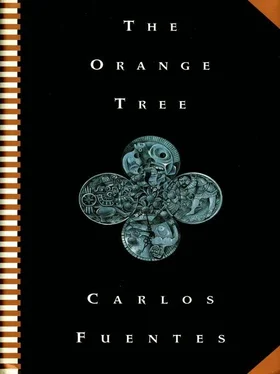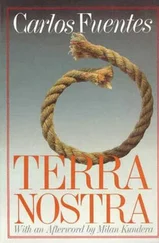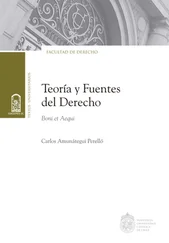That is perhaps the true star that crosses the sea and links the two shores. The Spaniards — I must clarify this point while I still have time — did not understand it at first. When I reached Seville mounted on my verbal star, they confused its fleetingness and its light with that of a terrible bird, the combination of all the birds of prey that fly in the deepest obscurity, but less frightening in their flight than in their landing, their ability to drag themselves along the earth with the mercurial destruction of a poison: a vulture in the skies, a serpent on the ground, this mythological being that flew over Seville and dragged itself over Estremadura, blinded the saints, and seduced the demons of Spain, frightening all with its newness, was, like the Spanish horses in Mexico, invincible.
Transformed into a monster, this beast was, nevertheless, only a word. And the word unfolds, made of scales in the air, made of feathers on earth, like a single question: How long before the present arrives?
Twin sister of God, twin sister of man: over the lake of Mexico, along the river of Seville, the eyelids of the sun and the moon open at the same time. Our faces are streaked by fire, but at the same time our tongues are furrowed by memory and desire. The words live on the two shores. And they do not heal.
London — Mexico, Winter 1991–1992
June 1, 1992
And if we think about it carefully, we see that he was unlucky in all his ventures after we conquered New Spain. They say it’s because curses were put on him.
— BERNAL DÍAZ DEL CASTILLO, True History of the Conquest of New Spain
MARTÍN 2
MY father, Hernán Cortés, conqueror of Mexico, had twelve children. From the youngest to the oldest, there are three girls he had with his last wife, the Spaniard Juana de Zúñiga: María, Catalina, and Juana — a bouquet of pretty little ladies who were born late and didn’t have to bear the burden of the harm done to their father, only his glorious memory. Also by the Zúñiga woman he had my brother Martín Cortés: we have the same name. Not only that, the same destiny. There were also two stillborn children, Luis and Catalina.
My father conquered a lot of flesh, as much flesh as land. From the conquered king Moctezuma he stole his favorite daughter, Ixcaxóchitl—“Cotton Flower”—and by her had a daughter, Leonor Cortés. With a nameless Aztec princess he had another daughter, this one born deformed, the so-called María. With an anonymous woman, he had a son named Amadorcico, whom, he told us, he loved, then forgot about, leaving him dead or abandoned in Mexico. A worse fate befell another son, Luis Altamirano, whom he had by Elvira (or perhaps Antonia) Hermosillo in 1529. Our prodigal, astute, conquered father disinherited him in his last will and testament. But no one suffered greater misfortune than his first daughter, Catalina Pizarro, born in Cuba in 1514. Her mother’s name was Leonor Pizarro.
Our father pampered her, but the widow Zúñiga persecuted her, deprived her of her property, and condemned her to live out her life — against her will — locked away in a convent.
I am the first Martín, the bastard son of my father and Doña Marina, my Indian mother, the so-called Malinche, the interpreter without whom Cortés wouldn’t have conquered anything. My father abandoned us when Mexico fell and my mother was no longer of any use to him in conquests and actually hampered his ability to rule. I grew up far away from my father, my mother having been given to the soldier Juan Xaramillo. I watched her die of smallpox in 1527. My father legitimated me in 1529. I am the firstborn but not the heir. I should be Martín the First but I’m merely Martín the Second.
MARTÍN 1
Three Catalinas, two Marías, two Leonors, two Luises, and two Martíns: our father didn’t have much imagination when it came to baptizing his children, and that sometimes leads to tremendous confusion. The other Martín, my elder brother, the son of the Indian woman, delights in the tale of the difficulties we’ve had. I prefer to recall the good times, and there was none better than my return to Mexico, the land conquered by my father for His Majesty the King. But let’s proceed step by step. I was born in Cuernavaca in 1532. I’m the product of the eventful trip my father made to Spain in 1528—his first since the conquest — which he undertook in order to be married and to reclaim the rights the colonial administration wanted to deny him by means of a trial instigated by certain envious parties. Spain, let me state this before going any further, is the land of envy. The Indies, and I can vouch for this in no uncertain terms, emulate and surpass the mother country in this category. Well then: it was in Béjar that Hernán Cortés entered into matrimony for the second time, now with my mother, Juana de Zúñiga. The King confirmed the rights and privileges owed to my father: titles, lands, and vassals. But when my parents and my grandmother returned to Mexico in March 1530, they were all held in Texcoco during my father’s trial. He was not able to enter Mexico City until January of the following year and took up residence in Cuernavaca, where, as I say, I was born. From then on, my father wore himself out in lawsuits and equally fruitless expeditions until, when I was eight, he returned with me to Spain, this time to fight not against Indians but against officials and lawyers.
At my father’s side, I left Mexico for Spain in 1540. We went to reclaim our property, our rights. The intrigues, the lawsuits, and the bitterness cost my father his life: to have fought so hard and with such good fortune in order to win for the King dominion nine times larger than Spain and then to end up wandering from inn to inn, owing money to tailors and servants, being the object of jokes and dirty tricks in the court! I was at his side when he died. A Franciscan and I. Neither of us could save him from the horrible wasting away brought on by dysentery. The stench of my father’s shit could not, however, wipe out the fresh scent of an orange tree that grew to the height of his window and which, during those months, bloomed splendidly.
He spoke some incomprehensible words before dying in Castilleja de la Cuesta, near Seville. He wasn’t allowed to die in peace in his Seville house because hordes of creditors and rogues buzzed around it like horseflies. Be that as it may, a great gentleman and better friend than the King himself, the Duke of Medina Sidonia, arranged a splendid funeral in the monastery of San Francisco in Seville: he filled the church with black hangings, burning wax tapers, flags and banners emblazoned with the coat of arms of the marquis, my father, yes sir, Marquis of the Valley of Oaxaca, Captain-General of New Spain, and Conqueror of Mexico, tides the envious could never strip him of. Titles which should have been mine since by my father’s will I was declared his successor and heir to his estate. Of course I abstained from promulgating the codicils in which my father ordered me to free the slaves on our Mexican lands and restore those lands to the conquered Indian communities. An old man’s attack of conscience, I told myself. If I did it, I’d be left with nothing. Did I beg his forgiveness? Of course. I’m not an evil person, even though I refused to carry out his dying wish. But seeing the fate of the contents of our Seville house was enough to make me feel no scruple whatsoever. Copper pots, kitchenware, trunks, torn tablecloths, sheets and mattresses, even old weapons that had fought their last battle long ago: all of it sold off at infamously low prices by the gates of the Seville cathedral when my father died. Was the final fruit of the conquest of Mexico to be an auction of mattresses and old saucepans? I decided to go back to Mexico and reclaim my inheritance. But first I opened the coffin in which our father, Hernán Cortés, was lying in order to see him for the last time. I was horrified, and my scream scratched its way through my teeth for a long time. Covering my dead father’s face was a dusty mask of jade and feathers.
Читать дальше












